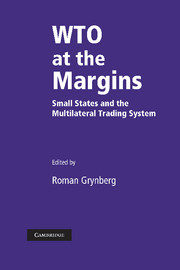Book contents
- Frontmatter
- Contents
- List of figures and appendices
- List of tables
- List of contributors
- Introduction
- Part I Theory and evidence
- Part II WTO and small economies
- 8 Small vulnerable economy issues and the WTO
- 9 Special and differential treatment for small developing economies
- 10 A study of alternative special and differential arrangements for small economies
- Part III WTO dispute settlement
- Part IV Negotiating issues and institutional arrangements
- Index
10 - A study of alternative special and differential arrangements for small economies
Published online by Cambridge University Press: 05 May 2010
- Frontmatter
- Contents
- List of figures and appendices
- List of tables
- List of contributors
- Introduction
- Part I Theory and evidence
- Part II WTO and small economies
- 8 Small vulnerable economy issues and the WTO
- 9 Special and differential treatment for small developing economies
- 10 A study of alternative special and differential arrangements for small economies
- Part III WTO dispute settlement
- Part IV Negotiating issues and institutional arrangements
- Index
Summary
Introduction
The difficulties faced by the small states (SS) in fully integrating into the world trading system are well documented. They include the problems created by transport costs together with the other costs associated with isolation and/or insularity and the absence of economies of scale and of scope associated with a small domestic market.1However, suggestions that the SS should receive a certain Special and Differential Treatment (SDT), modelled on, though not necessarily identical to, that enjoyed by the Least Developed Countries (LDCs), have not been broadly accepted, despite the obvious fact that, almost by definition, the SS are of little importance in world trade. Ex ante one would not anticipate a major distortion of trading patterns, for example through trade diversion, by giving producers each with a contribution to world trade measured in hundredths of one percentage point special treatment as regards market access or as regards compliance with WTO disciplines. Nor would the loss in tariff revenue appear, ex ante, to be large. This chapter looks at the possibilities of SDT based on de minimis thresholds, both in terms of preferential market access and WTO disciplines, though clearly more can be said of a quantitative nature as regards the first of these. As regards the former, it will look at the threats of trade diversion to the LDCs and other developing countries, and losses in tariff revenue that would be implied by extending preferential treatment to the SS.
- Type
- Chapter
- Information
- WTO at the MarginsSmall States and the Multilateral Trading System, pp. 356 - 422Publisher: Cambridge University PressPrint publication year: 2006
- 1
- Cited by



